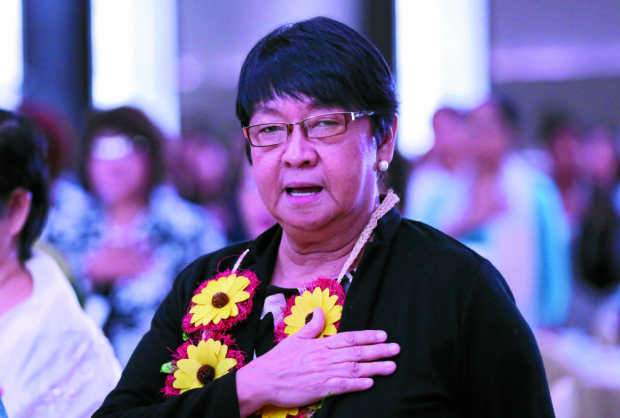Non-government organizations, the Department of Social Welfare and Development (DSWD) and the Commission on Human Rights (CHR) joined forces in opposing the proposal in Congress to lower the age of criminal liability to nine years old from the current 15.
The House of Representatives on Wednesday conducted its first hearing on the bills seeking to lower the age of criminal liability during the hearing by the justice subcommittee on correctional reforms.
READ: Alvarez seeks to lower age for minor offenders
Social Welfare Secretary Judy Taguiwalo wrote a letter to the committee expressing her strong opposition to the move which she described as anti-poor and has never resulted in lowering crime incidence.
“There is a need to distinguish between making children responsible for their actions, and criminalizing them,” Taguiwalo said in her letter, read aloud by her representative Rosalie Dagulo.
Taguiwalo said the move “runs counter to available scientific knowledge about the cognitive, psychosocial, and neurological development of children.”
She said the existing law Juvenile Justice Welfare Act which the bills seek to amend already present ways “to make children responsible, without making them criminals” as well as to “hold children accountable in entirely non-punitive, welfare-based, and education-oriented measures.”
“Lowering the minimum age of criminal liability violates the fundamental principles of social protection of children, as provided for by law, and by international treaties, and internationally-accepted standards and principles,” Taguiwalo said.
READ: UNICEF: Lowering criminal liability age harms kids’ well-being
In a letter to the committee, Commission on Human Rights (CHR) Jose Luis Gascon said there is a need to address first the deficiencies in children reformation centers known as “Bahay Pag-asa” which are provided under the law.
These facilities have “structural deficiencies” which fail to provide a “therapeutic” environment for the juvenile delinquents, the CHR said.
“The Commission joins all civil society organizations and other child rights advocates in their fight against the move to lower the minimum age of criminal liability. May this also serve as a reminder that our legislators and the present administration to recognize the vital role of the youth in nation-building and the concurrent mandate of the State to protect and promote their physical, moral, spiritual, intellectual and social well-being,” the CHR said in the letter.
For her part, Tricia Clare Oco, executive director of the DSWD-attached agency Juvenile Justice and Welfare Council, said the move would not reform children in conflict with the law, but would only damage their childhood by treating them as criminals instead of victims.
“The proposal to lower the minimum age of criminal responsibility will merely revert to the cruel situation of locking up many children in poor and subhuman facilities after they have been exploited and abused by syndicates, their parents and other adults further victimizing them,” Oco said.
READ: PH psychological association opposes lowering criminal liability age
Children’s Legal Rights and Development Center chairperson Rowena Legaspi said the involvement of children in syndicates is a manifestation of the failure of law enforcement to crack down on organized crime.
“The failure of the system to go after syndicates reflects the weakness of the law enforcers in implementing the law,” Legaspi said.
She lamented that children are being treated like criminals, instead of children who need to be taken care of.
“It is our position that these children should be taken care of; the main issues are the absence of their access to education, justice and health,” Legaspi said.
Kharlo Manano, secretary general of the Salinhali Alliance for Children’s Concerns, said the government should fulfill its role in taking care of the country’s youth instead of treating them as criminals.
Manano said children in conflict with the law should be treated instead as victims of state neglect.
“We should regard children as victims of state neglect and abandonment from their right to survival and be protected, denied from them at one point of their lives. They have been failed by society that now wants to brand them as criminals,” Manano said.
Meanwhile, representatives from the Public Attorney’s Office and the National Bureau of Investigation told the lawmakers that they were only amenable to lowering the age of liability from 15 years old to 12.
READ: Alvarez files bill lowering age of criminal liability
In House Bill 2, authors Speaker Pantaleon Alvarez and Deputy Speaker Capiz Rep. Fredenil Castro sought to revert the minimum age of criminal liability from the current 15 years old to as young as nine years old.
The House leaders’ bill entitled “Minimum Age of Criminal Responsibility Act” seeks to amend the “Juvenile Justice and Welfare Act of 2006” or Republic Act 9344, which set the minimum age for criminal liability at 15 years old.
The authors said children are being used by criminals as accomplices in their crimes, particularly drug trafficking, because these minors could not be held criminally liable.
“While the intent of protection of the Filipino youth may be highly laudable, its effects have had the opposite effects – the pampering of youthful offenders who commit crimes knowing they can get away with it,” Castro and Alvarez said in their explanatory note.
The proposed bill however exempts from criminal liability those under nine years old at the time of the commission of an offense.
But they would be subjected to a government intervention program, the bill read. JE
